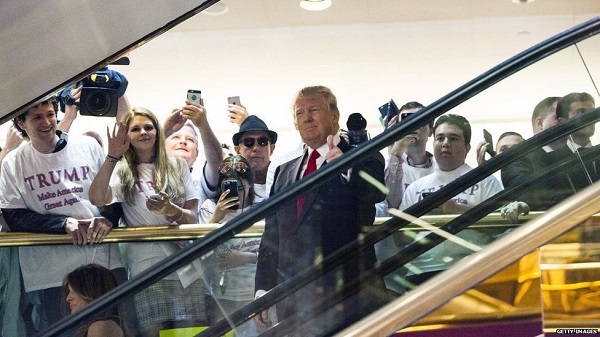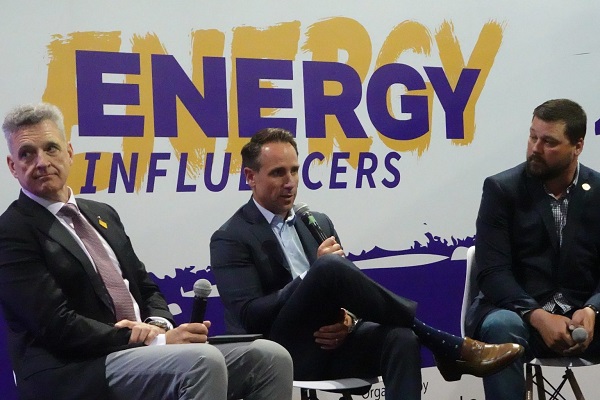Uncategorized
Trump doubts negotiators will strike budget deal he’d accept

WASHINGTON — President Donald Trump said the odds congressional negotiators will craft a deal to end his border wall standoff with Congress are “less than 50-50.”
As hundreds of thousands of furloughed federal workers prepared to return to work, Trump told The Wall Street Journal that he doesn’t think the negotiators will strike a deal that he’d accept. He pledged to build a wall anyway using his executive powers to declare a national emergency if necessary.
“I personally think it’s less than 50-50, but you have a lot of very good people on that board,” Trump said in an interview Sunday with the newspaper.
The president was referring to a bipartisan committee of House and Senate lawmakers that will consider border spending as part of the legislative process.
The president’s standoff with Democrats on Capitol Hill is far from over and the clock is ticking. The spending bill Trump signed on Friday to temporarily end the partial government shutdown funds the shuttered agencies only until Feb. 15.
It’s unclear if the Democrats will budge. Trump seemed girded for battle over the weekend, sending out a series of online messages that foreshadowed the upcoming fight with lawmakers. “BUILD A WALL & CRIME WILL FALL!” he tweeted.
Is Trump prepared to shut down the government again in three weeks?
“Yeah, I think he actually is,” acting White House chief of staff Mick Mulvaney said. “He doesn’t want to shut the government down, let’s make that very clear. He doesn’t want to declare a national emergency.”
But Mulvaney said that at “the end of the day, the president’s commitment is to defend the nation and he will do it with or without Congress.”
The linchpin in the standoff is Trump’s demand for $5.7 billion for his prized wall at the U.S.-Mexico border, a project Democrats consider an ineffective, wasteful monument to a ridiculous Trump campaign promise.
Asked if he’d willing to accept less than $5.7 billion to build a barrier on the southern border, Trump replied: “I doubt it.” He added: “I have to do it right.”
He also said he’d be wary of any proposed deal that exchanged funds for a wall for broad immigration reform. And when asked if he would agree to citizenship for immigrants who were illegally brought into the U.S. as children, he again replied, “I doubt it.”
California Rep. Kevin McCarthy, the leading Republican in the House, said Democrats have funded border barriers in the past and are refusing this time simply because Trump is asking for it.
“The president is the only one who has been reasonable in these negotiations,” he said.
Rep. Hakeem Jeffries of New York, a member of the Democratic leadership in the House, said his colleagues are looking for “evidence-based” legislation.
“Shutdowns are not legitimate negotiating tactics when there’s a public policy disagreement between two branches of government,” he said.
Jeffries said that Democrats are willing to invest in additional infrastructure, especially at legal ports of entry where the majority of drugs come into the country.
“We’re willing to invest in personnel. We’re willing to invest in additional technology. … In the past, we have supported enhanced fencing and I think that’s something that’s reasonable that should be on the table,” he said.
Trump has asserted there is a “crisis” at the southern border requiring a wall, blaming previous presidents and Congress for failing to overhaul an immigration system that has allowed millions of people to live in the U.S. illegally.
Last month, he put that number at 35 million, while on Sunday he pegged it at 25.7 million-plus — figures offered without evidence. “I’m not exactly sure where the president got that number this morning,” Mulvaney said.
Both are higher than government and private estimates.
His homeland security chief cited “somewhere” between 11 million and 22 million last month. In November, the nonpartisan Pew Research Center reported 10.7 million in 2016 — the lowest in a decade.
The president also tweeted Sunday that the cost of illegal immigration so far this year was nearly $19 billion; he didn’t cite a source.
Compare that with research in 2017 from a conservative group, the Federation for American Immigration Reform, which advocates for less immigration: $135 billion a year or about $11.25 billion a month — a figure that included health care and education, plus money spent on immigration enforcement.
Sen. Roy Blunt, R-Mo. said that he thinks a compromise is possible.
“The president went from talking about a wall along the entire southern border at one point during the campaign … to let’s have barriers where they work and let’s have something else where barriers wouldn’t work as well,” Blunt said.
The partial federal shutdown ended Friday when Trump gave in to mounting pressure, retreating from his demand that Congress commit to the border wall funding before federal agencies could resume work. The bill he signed did not provide the money Trump wanted for a barrier, which House Speaker Nancy Pelosi has called “immoral” and has insisted Congress will not finance.
Mulvaney said Trump agreed to temporarily end the shutdown because some Democrats have stepped forward, publicly and privately, to say they agree with Trump’s plan to better secure the border.
Mulvaney said they told Trump they couldn’t split with Pelosi and Senate Democratic Leader Chuck Schumer, and work with the White House if the government remained closed.
“Everybody wants to look at this and say the president lost,” Mulvaney said. “We’re still in the middle of negotiations.”
___
Mulvaney appeared on “Fox News Sunday” and CBS’ “Face the Nation.” Jeffries and McCarthy spoke on NBC’s “Meet the Press,” Blunt was on Fox.
Deb Riechmann, The Associated Press
Uncategorized
Kananaskis G7 meeting the right setting for U.S. and Canada to reassert energy ties


Energy security, resilience and affordability have long been protected by a continentally integrated energy sector.
The G7 summit in Kananaskis, Alberta, offers a key platform to reassert how North American energy cooperation has made the U.S. and Canada stronger, according to a joint statement from The Heritage Foundation, the foremost American conservative think tank, and MEI, a pan-Canadian research and educational policy organization.
“Energy cooperation between Canada, Mexico and the United States is vital for the Western World’s energy security,” says Diana Furchtgott-Roth, director of the Center for Energy, Climate and Environment and the Herbert and Joyce Morgan Fellow at the Heritage Foundation, and one of America’s most prominent energy experts. “Both President Trump and Prime Minister Carney share energy as a key priority for their respective administrations.
She added, “The G7 should embrace energy abundance by cooperating and committing to a rapid expansion of energy infrastructure. Members should commit to streamlined permitting, including a one-stop shop permitting and environmental review process, to unleash the capital investment necessary to make energy abundance a reality.”
North America’s energy industry is continentally integrated, benefitting from a blend of U.S. light crude oil and Mexican and Canadian heavy crude oil that keeps the continent’s refineries running smoothly.
Each day, Canada exports 2.8 million barrels of oil to the United States.
These get refined into gasoline, diesel and other higher value-added products that furnish the U.S. market with reliable and affordable energy, as well as exported to other countries, including some 780,000 barrels per day of finished products that get exported to Canada and 1.08 million barrels per day to Mexico.
A similar situation occurs with natural gas, where Canada ships 8.7 billion cubic feet of natural gas per day to the United States through a continental network of pipelines.
This gets consumed by U.S. households, as well as transformed into liquefied natural gas products, of which the United States exports 11.5 billion cubic feet per day, mostly from ports in Louisiana, Texas and Maryland.
“The abundance and complementarity of Canada and the United States’ energy resources have made both nations more prosperous and more secure in their supply,” says Daniel Dufort, president and CEO of the MEI. “Both countries stand to reduce dependence on Chinese and Russian energy by expanding their pipeline networks – the United States to the East and Canada to the West – to supply their European and Asian allies in an increasingly turbulent world.”
Under this scenario, Europe would buy more high-value light oil from the U.S., whose domestic needs would be back-stopped by lower-priced heavy oil imports from Canada, whereas Asia would consume more LNG from Canada, diminishing China and Russia’s economic and strategic leverage over it.
* * *
The MEI is an independent public policy think tank with offices in Montreal, Ottawa, and Calgary. Through its publications, media appearances, and advisory services to policymakers, the MEI stimulates public policy debate and reforms based on sound economics and entrepreneurship.
As the nation’s largest, most broadly supported conservative research and educational institution, The Heritage Foundation has been leading the American conservative movement since our founding in 1973. The Heritage Foundation reaches more than 10 million members, advocates, and concerned Americans every day with information on critical issues facing America.
Uncategorized
Poilievre on 2025 Election Interference – Carney sill hasn’t fired Liberal MP in Chinese election interference scandal

From Conservative Party Communications
“Yes. He must be disqualified. I find it incredible that Mark Carney would allow someone to run for his party that called for a Canadian citizen to be handed over to a foreign government on a bounty, a foreign government that would almost certainly execute that Canadian citizen.
“Think about that for a second. We have a Liberal MP saying that a Canadian citizen should be handed over to a foreign dictatorship to get a bounty so that that citizen could be murdered. And Mark Carney says he should stay on as a candidate. What does that say about whether Mark Carney would protect Canadians?
“Mark Carney is deeply conflicted. Just in November, he went to Beijing and secured a quarter-billion-dollar loan for his company from a state-owned Chinese bank. He’s deeply compromised, and he will never stand up for Canada against any foreign regime. It is another reason why Mr. Carney must show us all his assets, all the money he owes, all the money that his companies owe to foreign hostile regimes. And this story might not be entirely the story of the bounty, and a Liberal MP calling for a Canadian to be handed over for execution to a foreign government might not be something that the everyday Canadian can relate to because it’s so outrageous. But I ask you this, if Mark Carney would allow his Liberal MP to make a comment like this, when would he ever protect Canada or Canadians against foreign hostility?
“He has never put Canada first, and that’s why we cannot have a fourth Liberal term. After the Lost Liberal Decade, our country is a playground for foreign interference. Our economy is weaker than ever before. Our people more divided. We need a change to put Canada first with a new government that will stand up for the security and economy of our citizens and take back control of our destiny. Let’s bring it home.”
-

 espionage1 day ago
espionage1 day agoFrom Sidewinder to P.E.I.: Are Canada’s Political Elites Benefiting from Beijing’s Real Estate Reach?
-

 Business2 days ago
Business2 days agoCanada’s critical minerals are key to negotiating with Trump
-

 Business21 hours ago
Business21 hours agoSenator wants to torpedo Canada’s oil and gas industry
-

 Bruce Dowbiggin20 hours ago
Bruce Dowbiggin20 hours agoFUBAR: How Trudeau & Trump Rewrote This Century’s Political Handbook
-

 Business2 days ago
Business2 days agoRFK Jr. planning new restrictions on drug advertising: report
-

 Alberta1 day ago
Alberta1 day agoAlberta’s carbon diet – how to lose megatonnes in just three short decades
-

 Energy1 day ago
Energy1 day agoWho put the energy illiterate in charge?
-

 espionage1 day ago
espionage1 day agoFBI Buried ‘Warning’ Intel on CCP Plot to Elect Biden Using TikTok, Fake IDs, CCP Sympathizers and PRC Students—Grassley Probes Withdrawal






